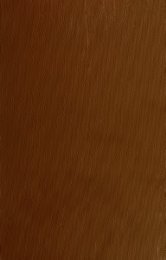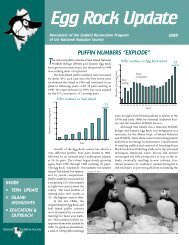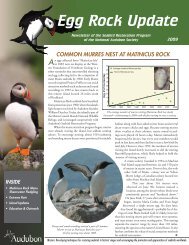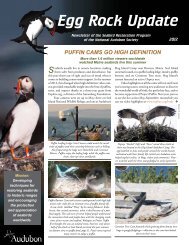- Page 2 and 3:
_ CO 2 , c/J V -^ U) Z CO > -" Z (
- Page 7 and 8:
^ i&irli lore Al^ ILLUSTRATED BI-MO
- Page 9 and 10:
INDEX TO ARTICLES IN VOLUME XVIII B
- Page 11 and 12:
(Iresslcy, L. II., Christmas Census
- Page 13 and 14:
Sager, Geraldine, A Bird Game for t
- Page 15 and 16:
Forbush's 'Food Plants to Attract B
- Page 17 and 18:
\H^?5^ A New Book by the Author of
- Page 19 and 20:
SIXTEENTH CHRISTMAS BIRD CENSUS COP
- Page 21 and 22:
^ ou likt- (he (jutdoon, don'l you
- Page 24 and 25:
1. Alaska Chickadee 4. Black-capped
- Page 26 and 27:
2 Bird - Lore ing backward and forw
- Page 28 and 29:
Bird - Lore I have met with the Pin
- Page 30 and 31:
6 Bird -Lore the settler. The three
- Page 32 and 33:
8 Bird - Lore good authorities said
- Page 34 and 35:
lO Bird - Lore Soon their whole asp
- Page 36 and 37:
WITH Bird-Lore's Advisory Council s
- Page 38 and 39:
The Migration of North American Bir
- Page 40 and 41:
i6 Bird -Lore CHESTNUT-BACKED CHICK
- Page 42 and 43:
THE Bird-Lore's Sixteenth Christmas
- Page 44 and 45:
20 Bird - Lore Mallard, 2; Black Du
- Page 46 and 47:
22 Bird - Lore i; Myrtle Warbler, 1
- Page 48 and 49:
24 — Bird - Lore — Mr. and Spar
- Page 50 and 51:
26 Bird -Lore Englewood, N. J.— D
- Page 52 and 53:
— — 28 Bird - Lore Sparrow, lo;
- Page 54 and 55:
— — 30 Bird - Lore i; Flicker,
- Page 56 and 57:
32 — Bird -Lore Pipit, 25; Mockin
- Page 58 and 59:
34 Bird - Lore Song Sparrow, 8; Swa
- Page 60 and 61:
36 — — Bird - Lore hatch, 3; Tu
- Page 62 and 63:
38 Bird - Lore tailed Hawk, 3 (and
- Page 64 and 65:
— — 40 Bird - Lore Vemilion Fly
- Page 66 and 67:
42 Bird - Lore 20; Surf Scoter, 60;
- Page 68 and 69:
44 a map and five halftones. Unfort
- Page 70 and 71:
SCHOOL DEPARTMENT Edited by ALICE H
- Page 72 and 73:
48 Bird - Lore older, their interes
- Page 74 and 75:
50 Bird - Lore black bird, as the c
- Page 76 and 77:
52 Bird -Lore Birds, through lack o
- Page 78 and 79:
54 Bird - Lore BIRDS AT SCHOOL I th
- Page 80 and 81:
THE SHOVELLER By T. GILBERT PEARSON
- Page 83 and 84:
The Shoveller 57 potato, which is a
- Page 85 and 86:
The Shoveller 59 to their small siz
- Page 88 and 89:
— 62 Bird - Lore Carolina, North
- Page 90 and 91:
EDWAUD A. McILHENNY (64)
- Page 92 and 93:
66 Bird - Lore was purchased on Jul
- Page 94 and 95:
A NEIGHBORHOOD GATHERING From a dra
- Page 96 and 97:
70 A Michigan Bulletin The Michigan
- Page 98 and 99:
72 The following reports of State A
- Page 100 and 101:
74 Illinois.— We have had an acti
- Page 102 and 103:
76 Bird - Lore Sustaining Members,
- Page 104 and 105:
Annual Garden Number OF The Craftsm
- Page 106 and 107:
A BIRD BOOK FOR TEACHERS By FRANK M
- Page 108 and 109:
I&irli - lore March -April, 1916 CO
- Page 110:
Everything from "Soup to Nuts" for
- Page 113 and 114:
2^irb=1Lore A BI-MONTHLY MAGAZINE D
- Page 115 and 116:
The World's Record for Density of B
- Page 117 and 118:
A FLICKER WAS NESTING IN BOX AND DI
- Page 119 and 120:
The World's Record for Density of B
- Page 121 and 122:
THE The Spring Migration of 1915 at
- Page 123 and 124:
The Spring Migration of 1915 at Ral
- Page 125 and 126:
First Efforts at Bird Photography 8
- Page 127 and 128:
First Efforts at Bird Pliotography
- Page 129 and 130:
The Interesting Barn Owl 93 not a f
- Page 131 and 132:
The Interesting Barn Owl 95 of mind
- Page 133 and 134:
The Migration of North American Bir
- Page 135 and 136:
Notes on the Plumage of North Ameri
- Page 137 and 138:
It is understood that every family
- Page 139 and 140:
A Tropical Migration Tragedy [We ar
- Page 141 and 142:
. of it as now very scarce in south
- Page 143 and 144:
a huge winter Goldfinch; in flight,
- Page 145 and 146:
finally flew to a spruce tree on th
- Page 147 and 148:
the voyages and expeditions of Capt
- Page 149 and 150:
SCHOOL DEPARTMENT Edited by ALICE H
- Page 151 and 152:
adiance . . . He The Audubon Societ
- Page 153 and 154:
The Audubon Societies 117 Their mou
- Page 155 and 156:
The Audubon Societies 119 The appro
- Page 157 and 158:
The Audubon Societies 121 An illust
- Page 159 and 160:
The Audubon Societies 123 MY BLUEBI
- Page 161 and 162:
The Audubon Societies 125 mentioned
- Page 163 and 164:
FEMALE RED-WINGED BLACKBIRD, NEST A
- Page 165:
CHESTNUT-SIDED WARBLER Order-PASSER
- Page 168 and 169:
I30 Bird - Lore o'clock on the 14th
- Page 170 and 171:
EXECUTIVE DEPARTMENT Edited by T. G
- Page 172 and 173:
134 Bird -Lore PHOTOGRAPHING WATER
- Page 174:
PINTAILS, TEALS, AND COOTS, PHOTOGR
- Page 177 and 178:
The Audubon Societies 139 BIRDS AND
- Page 179 and 180:
work went out, after the meeting, a
- Page 181 and 182:
FLORENCE MERRIAM BAILEY (143)
- Page 183 and 184:
Sustaining Members, continued Gale,
- Page 185 and 186:
Penfold, Edmund Petty, K. R $10 00
- Page 187 and 188:
Birds Beautifying Cemeteries Some t
- Page 189 and 190:
Edmanson Martin House. -B moms. Pri
- Page 191 and 192:
JOIN THIS ASSOCIATION AND HELP THE
- Page 193 and 194:
New, Revised Edition of the Handboo
- Page 195 and 196:
MAY—JUNE, 1916 COPYRIOHT, ISie, B
- Page 197 and 198:
Free Free The Bird Book By CHESTER
- Page 200 and 201:
1. SAGE THRASHER 3. CATBIRD 2. MOCK
- Page 202 and 203:
152 Bird - Lore field-glasses, took
- Page 204 and 205:
154 Bird -Lore male departed at onc
- Page 206 and 207:
SHORT-BILLED MARSH WREN NEAR NEST P
- Page 208 and 209:
158 Bird -Lore ready to think that
- Page 210 and 211:
A Domestic Tragedy By JULIA MOESEL,
- Page 212 and 213:
l62 Bird - Lore noon satisfied, or
- Page 214 and 215:
IT BREWER'S BLACKBIRD Snapping the
- Page 216 and 217:
Some Experiences in Attracting Bird
- Page 218 and 219:
i68 Bird - Lore cedars (Juniperus v
- Page 220:
I70 Bird -Lore Naturally, I was ver
- Page 223 and 224:
j^otes from JTielti anti ^tutjp Not
- Page 225 and 226:
at their feet, and paddled off to h
- Page 227 and 228:
in the low apple and elm trees bord
- Page 229 and 230:
use dry leaves in this manner. L. H
- Page 231 and 232:
Johnsbury, Vermont, hoping there wi
- Page 233 and 234:
— the hedge as they dropped the b
- Page 235 and 236:
%ook Ji^ettjs; anti Ctetiietos; LiT
- Page 237:
need much verification by professio
- Page 240 and 241:
'^fje Butruljon Societies; SCHOOL D
- Page 242 and 243:
192 Bird -Lore Plumage Molt Time 1.
- Page 244 and 245:
194 Bird - Lore Young birds are usu
- Page 246 and 247:
196 Bird - Lore OBSERVATIONS OF ADU
- Page 248 and 249:
198 Bird - Lore Two days after as I
- Page 250 and 251:
— 200 Bird - Lore TWO MEMBERS OF
- Page 252 and 253:
THE REDSTART By T. GILBERT PEARSON
- Page 255 and 256:
The Redstart 203 have often found t
- Page 257 and 258:
The Redstart 205 land-route to nort
- Page 259 and 260:
analyticall}' indexed, that is, a r
- Page 261 and 262:
The Audubon Societies 209 A CHICKAD
- Page 263 and 264:
The Audubon Societies 211 NEW MEMBE
- Page 265 and 266:
Previously acknowledged Allen, Miss
- Page 267 and 268:
A FISH HAWK'S lA.MiLV From an etchi
- Page 269 and 270: Stereopticon Slides for Sale The Na
- Page 271 and 272: A BIRD BOOK FOR TEACHERS 2?irb=1ltf
- Page 273 and 274: A New, Revised Edition of the Color
- Page 275 and 276: JULY—AUGUST, 1916 COPYRIGHT. 1916
- Page 277 and 278: Free Free The Bird Guide By CHESTER
- Page 280 and 281: 1. PIPIT, winter 3. SPRAGUE'S PIPIT
- Page 282 and 283: 2l8 Bird- Lore though all the origi
- Page 284 and 285: 220 Bird - Lore THE WINTER BIRDS So
- Page 286 and 287: Bird- Lore was once noted in Januar
- Page 288 and 289: 224 Bird -Lore liberally in the par
- Page 290 and 291: 226 Bird- Lore A few species have b
- Page 292 and 293: 228 Bird - Lore MAP OF THE NORTHERN
- Page 294 and 295: 230 Bird -Lore After discovering it
- Page 296 and 297: 232 Bird- Lore several tree trunks
- Page 298 and 299: 234 Bird - Lore a V with the mother
- Page 301: A Successful Bird Exhibit 237 Feed
- Page 304 and 305: Notes on the Plumage of North Ameri
- Page 306 and 307: A HUMMINGBIRD FAMILY AND HOW IT WAS
- Page 308 and 309: 244 ^i^'d - Lore REGULATION 2. CLOS
- Page 310 and 311: Jtotes from JTielti ant> ^tutip Mou
- Page 312 and 313: 248 Bird - Lore twigs, while she ca
- Page 314 and 315: — 250 Bird - Lore and another flo
- Page 316 and 317: — 252 Bird- Lore The morning they
- Page 318 and 319: 254 rival male; we know of no femal
- Page 322 and 323: 258 Bird -Lore rare aviaries of the
- Page 324 and 325: OPEN -^ Tl ELDS (260) C/> MPO& NoiS
- Page 326 and 327: 262 Bird - Lore anxious to know mor
- Page 328 and 329: 264 Bird - Lore Chapman's 'Handbook
- Page 330 and 331: 266 Bird - Lore leave her nest. It
- Page 332 and 333: — 268 Bird - Lore ! ! wings. Then
- Page 334 and 335: THE VEERY By T. GILBERT PEARSON EDU
- Page 337 and 338: The Veery 271 On June 18, 1914, 1 f
- Page 339 and 340: The Veery 273 southward flying, in
- Page 341 and 342: children, and hundreds of appreciat
- Page 343 and 344: The Audubon Societies 277 THE EDUCA
- Page 345 and 346: The Audubon Societies 279 JUNIOR AU
- Page 348 and 349: 282 Bird - Lore alert. There has be
- Page 350 and 351: and books; and furnished its leafle
- Page 352 and 353: Life Members: Collins, Thomas H. Fi
- Page 354 and 355: Sustaining Members, continued Vaugh
- Page 356 and 357: A BIRD BOOK FOR TEACHERS By FRANK M
- Page 358 and 359: THE WARBLERS of NORTH AMERICA By FR
- Page 360 and 361: Mvo - lore September-October, 1916
- Page 362: The Condor A MAGAZINE, OF WE,STE-RN
- Page 365 and 366: 2?trb=1Lore A BI-MONTHLY MAGAZINE D
- Page 367 and 368: Cardinals Through the Year 291 Duri
- Page 370 and 371:
A NUMBER Protection of Migrating Bi
- Page 372 and 373:
An Ancient Bird Census in Asphaltic
- Page 374 and 375:
298 Bird - Lore Crane and Raven. Fa
- Page 376 and 377:
300 Bird - Lore The winter was an u
- Page 378 and 379:
302 Bird - Lore The birds remained
- Page 380 and 381:
304 Bird - Lore and adding millet,
- Page 382 and 383:
WHEN Screech Owl Johnnie By FLORENC
- Page 384 and 385:
3o8 Bird - Lore At intervals the ne
- Page 386 and 387:
3IO Bird -Lore from the bracken by
- Page 388 and 389:
ROUGH-LEGGED HAWK Photographed by H
- Page 390 and 391:
314 and about fifteen feet above th
- Page 392 and 393:
— 3i6 Bird - Lore ambient air and
- Page 394 and 395:
31^ Bird - Lore Quick Lunch The sno
- Page 396 and 397:
320 Bird - Lore Alleghany Mountains
- Page 398 and 399:
BANK SWALLOWS Photographed by A. A.
- Page 400 and 401:
324 Birds; Bibliography [very brief
- Page 402 and 403:
326 Bird - Lore 2^irb=1Lore A Bi-Mo
- Page 404 and 405:
328 Bird -Lore school curriculum. T
- Page 406 and 407:
330 Bird -Lore Huxley: A Piece of C
- Page 408 and 409:
332 Bird -Lore and then a Spotted S
- Page 410 and 411:
334 Bird - Lore selected such a van
- Page 412 and 413:
336 &ird-Lore brick and mortar, not
- Page 414 and 415:
338 Bird- Lore A STORY OF A QUAIL I
- Page 416 and 417:
340 Bird - Lore just think of the e
- Page 418 and 419:
THE AVOCET By T. GILBERT PEARSON ^t
- Page 421 and 422:
The Avocet 343 would be seen, but t
- Page 423 and 424:
The Avocet 345 a "rare transient" o
- Page 425 and 426:
desirous of saving from indiscrimin
- Page 427 and 428:
The Audubon Societies 340 NEW MEMBE
- Page 429 and 430:
A New, Revised Edition of the Color
- Page 431 and 432:
COPYRIGHT. ISie, BY FRANK M. CHAPMA
- Page 433 and 434:
JOIN THIS ASSOCIATION AND HELP THE
- Page 435 and 436:
Twenty-five Bird Songs for Children
- Page 438 and 439:
1. Cactus Wren 3. Carolina Wren 2.
- Page 440:
352 J*^ Bird -Lore -. . \ < TREE SP
- Page 443 and 444:
Dick, the Sandhill Crane The follow
- Page 445 and 446:
Observations on Woodpeckers By WILL
- Page 447 and 448:
Observations on Woodpeckers 359 gam
- Page 449 and 450:
A House Wren Record 361 have any pl
- Page 451 and 452:
Notes on the Plumage of North Ameri
- Page 453 and 454:
^otes from JFielti ant) ^tutip Kill
- Page 455 and 456:
community. Cleanliness and success
- Page 457 and 458:
twenty-five. Our dining-room window
- Page 459 and 460:
In other winters, flocks of Chickad
- Page 461 and 462:
Worm-eating Warbler. No nest found,
- Page 463 and 464:
Thirty-fourth Congress of the Ameri
- Page 465 and 466:
United States,' and in Bird-Lore fo
- Page 467 and 468:
25irb=1Lore A Bi-Monthly Magazine D
- Page 470 and 471:
382 THE Bird - Lore A Christmas Tre
- Page 472 and 473:
384 Bird - Lore melodies in bird-mu
- Page 474 and 475:
3^6 Bird- Lore by means of our own
- Page 476 and 477:
388 Bird -Lore 'The Chimney Swallow
- Page 478 and 479:
390 Bird - Lore the Denton mount. I
- Page 480 and 481:
— 392 Bird- Lore inside. The Towh
- Page 482 and 483:
BLACK-NECKED STILT By T. GILBERT PE
- Page 485 and 486:
Black -necked Stilt 395 parently ha
- Page 487 and 488:
Black -necked Stilt 397 Barrows reg
- Page 489 and 490:
of the Michigan Audubon Society; A.
- Page 491 and 492:
Broadening Bird-Study Our organizer
- Page 494 and 495:
JOHN DRYDEN KUSER President of the
- Page 496 and 497:
4o6 Bird -Lore numbers, bird-protec
- Page 498 and 499:
4o8 Bird -Lore Missouri Audubon Soc
- Page 500 and 501:
4IO Bird -Lore Burroughs-Audubon Na
- Page 502 and 503:
412 Bird -Lore Erie (Pa.) Audubon S
- Page 504 and 505:
WARDEN FRED ENGLE POINTING TO TWO W
- Page 506 and 507:
4i6 Washington (Ind.) Bird Lovers'
- Page 508 and 509:
4i8 Bird - Lore Mrs. Alice Hall Wal
- Page 510 and 511:
420 Bird - Lore A more complete sta
- Page 512 and 513:
422 Bird -Lore of new owners, and,
- Page 514 and 515:
424 Bird - Lore Massachusetts. Char
- Page 516 and 517:
426 Bird- Lpre charge of Winthrop P
- Page 518 and 519:
428 Bird - Lore guidance or assista
- Page 520 and 521:
43° Bird - Lore tion as guest, at
- Page 522 and 523:
43^ Bird -Lore my stay in Maryland.
- Page 524 and 525:
434 Bird - Lore proceeded to tell m
- Page 526 and 527:
m^ •j^-i^'-m^'i.'i ^v CASPIAN TER
- Page 528 and 529:
438 Bird - Lore been made for Fores
- Page 530 and 531:
440 Bird - Lore virtually the whole
- Page 532 and 533:
442 Bird - Lore REPORTS OF AFFILIAT
- Page 534 and 535:
444 — — Bird- Lore feature into
- Page 536 and 537:
446 Bird - Lore prizes for bird-box
- Page 538 and 539:
448 — Bird - Lore The Society als
- Page 540 and 541:
450 Bird -Lore been able to reach a
- Page 542 and 543:
452 Bird - Lore New Hampshire Audub
- Page 544 and 545:
— 454 Bird - Lore Through the cou
- Page 546 and 547:
456 Bird -Lore also been given in v
- Page 548 and 549:
458 Bird- Lore enough money to buy
- Page 550 and 551:
460 Bird - Lore some 6,000 bird-but
- Page 552 and 553:
— 462 Bird - Lore on. 'Sportsmen'
- Page 554 and 555:
464 Bird - Lore talked in various s
- Page 556:
466 Bird - Lore sanctuaries, to pla
- Page 559 and 560:
Reports of State Societies and Bird
- Page 561 and 562:
Reports of State Societies and Bird
- Page 563 and 564:
— — Reports of State Societies
- Page 565 and 566:
Reports of State Societies and Bird
- Page 567 and 568:
— Reports of State Societies and
- Page 569 and 570:
Reports of State Societies and Bird
- Page 571 and 572:
Report of the Treasurer 481 JOHN H.
- Page 573 and 574:
Endowment Fund— Report of the Tre
- Page 575 and 576:
• Report of the Treasurer 485 INC
- Page 577 and 578:
Exhibit E Income— Report of the T
- Page 579 and 580:
2 21 2 List of Members 489 LISTS OF
- Page 581 and 582:
1 2 List of Members 491 LIFE MEMBER
- Page 583 and 584:
Avery, Samuel P $ Avis, Edward Aver
- Page 585 and 586:
Burt, Miss Edith. . . Burt, Mrs. J.
- Page 587 and 588:
Davis, Mrs. H. G.... Davis, Henry J
- Page 589 and 590:
Gates, MiloH.,D.D. Gates, Mrs. Wm.
- Page 591 and 592:
Inslee, Stephen D.. . Ireland, Miss
- Page 593 and 594:
Lusk, Mrs. Graham. Luther, Mrs. N.
- Page 595 and 596:
Ovington, Elizabeth Owen, Stanton P
- Page 597 and 598:
liussell, B. F. W.. . . Russell, Mr
- Page 599 and 600:
Swan, William D. . ,.$io Swann, Mrs
- Page 601 and 602:
. . Wiborg, F. B Widmann, Otto Wigg
- Page 603 and 604:
Hutchinson, Mrs. C. L $5 oc Jackson
- Page 605 and 606:
A NeWf Revised Edition of the Color
- Page 609 and 610:
00 _J 1 LI r- M 03 >( :d \ m (/) (/
- Page 611:
'Jl^. CO H Z -J z ARIES SMITHSONIAN







